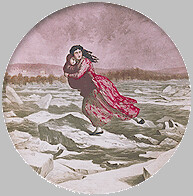It took all week but I finally finished! I was dreading this book. It was written in 1852 and much of it is in southern dialect and it just seemed hard. But much to my surprise I really liked it.
It needs to be said that from our perspective as twenty-first century Americans this book is racist and very patronizing. But it is also a very compelling story and moving as well. And the motives of Harriet Beecher Stowe were pure in her raging desire to bring slavery to an end. It is easy to believe the legend that when Abraham Lincoln met the author her said, "So you're the little lady who made this big war."
I don't know that I would have made it past chapter one if it hadn't been for my friend Nicole. Before I started the book I asked her, "How much of this do I really have to read of this before I switch to the SparkNotes to be able to claim that I read it?" She looked at me with such disappointment in her face and said, "You must read it all." And so, to keep my sterling reputation as an actual reader of books I did. And I don't regret it a bit. Nicole is so proud of me! And she also recommended two narratives written by slaves which are available on-line Narrative of the Life of Henry Bibb and Incidents in the Life of a Slave Girl by Harriet Jacobs. Both are fascinating and moving.
I would also recommend two books that deal with slavery and its aftermath that I found to be excellent. Beloved by Toni Morrison absolutely haunted me. So much so that I never even watched the movie. Toni Morrison is an unbearably good writer. Another of my favorite authors is Walter Mosely. (He was also former president Bill Clinton's favorite writer, so make of that what you will...) I am a huge fan of his Easy Rawlins mysteries which I will recommend again when I am writing about Early Autumn. He has written an interesting young adult novel about a slave who is made immortal called 47.
One note about this novel - you need to remember the historical context. The author makes sweeping racial generalizations about slaves - generally positive but still very stereotypical. There was also a casual bit of anti-semitism. And finally - so much evangelical preaching that I felt as if I were still in the halls of the baptist high school I attended. The dialect and the exhortations to the reader make the writing seem a bit awkward. But it is a novel that helped our country evolve towards a more equitable and humane future.

No comments:
Post a Comment